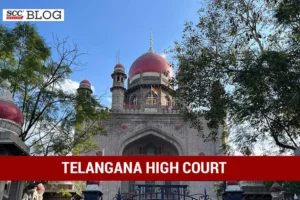Telangana High Court: In a case wherein the petitioners wanted their son’s status of religion and caste to be ‘no religion’ and ‘no caste’ in the birth certificate but were being denied by the respondents, Lalitha Kanneganti, J., held that the petitioners had every right not to specify religion or caste in the birth certificate. Thus, the Court directed the respondents to provide a column for “no religion”, “no caste” in the online application format and receive the petitioners’ application for registering the birth of their son, by virtue of Article 25 of the Constitution.
Background
The petitioners were wife and husband, and they belonged to two different religions, thus their marriage was inter-caste and inter-religious marriage. When they wanted to apply for a birth certificate for their son, they found that it was must to fill the religious status of the child in Column No. 9, without which the application was incomplete and the same could not be presented. Under the religion column, the options given were (a) Hindu; (b) Islam; (c) Christian and (D) other religions. “Any other” option was also prescribed under Religion column only, but there was no option for non-religious practitioners or identity.
The petitioners submitted that India was a secular country and by virtue of these applications, they could not compel a citizen to mention that he/she belonged to a particular religion against their will and wish by virtue of online platform. It was further submitted that the petitioners had made representations to all respondents and requested them to consider the request and give them a provision to claim the child status as non-religious and no caste. As this being an online registration application format, which would decide for all future purposes such as school admission certificate, etcetera, the petitioners could not fill their son’s online application format and did not get the birth certificate till now.
Analysis, Law, and Decision
The Court relied on ABC v. State (NCT of Delhi), (2015) 10 SCC 1, wherein the Supreme Court emphasized that it was the responsibility of the State to ensure that no citizen suffered from any inconvenience or disadvantage merely because the parents failed or neglected to register the birth. It was the duty of the State to take requisite steps for recording the birth of every citizen.
The Court observed opined that “Article 25 of the Constitution conferred freedom of conscience on a citizen which was a fundamental right guaranteed to a citizen. It conferred the right to freely profess, practice or propagate any religion, which included in it the citizens right to say that they did not believe in any religion, and they did not want to profess, practice, or propagate any religion. The citizen had a right to act as per his conscience and beliefs. The State could not compel the citizen to profess or declare that he belonged to one religion or the other. If he was compelled to do so, it was nothing, but infringement of his fundamental rights guaranteed by the Constitution”.
The Court further relied on Navtej Singh Johar v. Union of India, (2018) 10 SCC 1, wherein the Supreme Court held that “it was not only the duty of the State and the judiciary to protect the basic right to dignity but the collective at large owes a responsibility to respect one another’s dignity for showing respect for the dignity of another was a constitutional duty. It was an expression of the component of constitutional fraternity. The Constitution has ladened the judiciary with the important duty to protect and ensure the right of every individual including the right to express and choose without any impediments to enable an individual to fully realize his/her fundamental right to live with dignity”.
The Court opined that the petitioners had every right not to follow or profess any religion and such right was implicit in Article 25 of the Constitution. It was the bounden duty of the respondents to act in consonance with the rights guaranteed to the citizen by the Constitution. The system must evolve along with the times, the changing requirements of the citizens. The Constitutional Court could not remain a mute spectator to the legitimate requirement of a citizen.
The Court held that the petitioners had every right not to specify religion or caste in the birth certificate. Accordingly, the writ petition was allowed directing the respondents to provide a column for “no religion”, “no caste” in the online application format and receive the petitioners’ application for registering the birth of their son, by virtue of Article 25 of the Constitution. The petitioners had every right to claim that they did not belong to any religion/caste.
[Sandepu Swaroopa v. Union of India, 2023 SCC OnLine TS 2377, decided on 19-7-2023]
*Judgment authored by: Justice Lalitha Kanneganti
Advocates who appeared in this case:
For the Petitioners: M. Venkanna, Counsel
For the Respondents: Asst. Solicitor General; GP for School Education; Standing Counsel for Municipality

